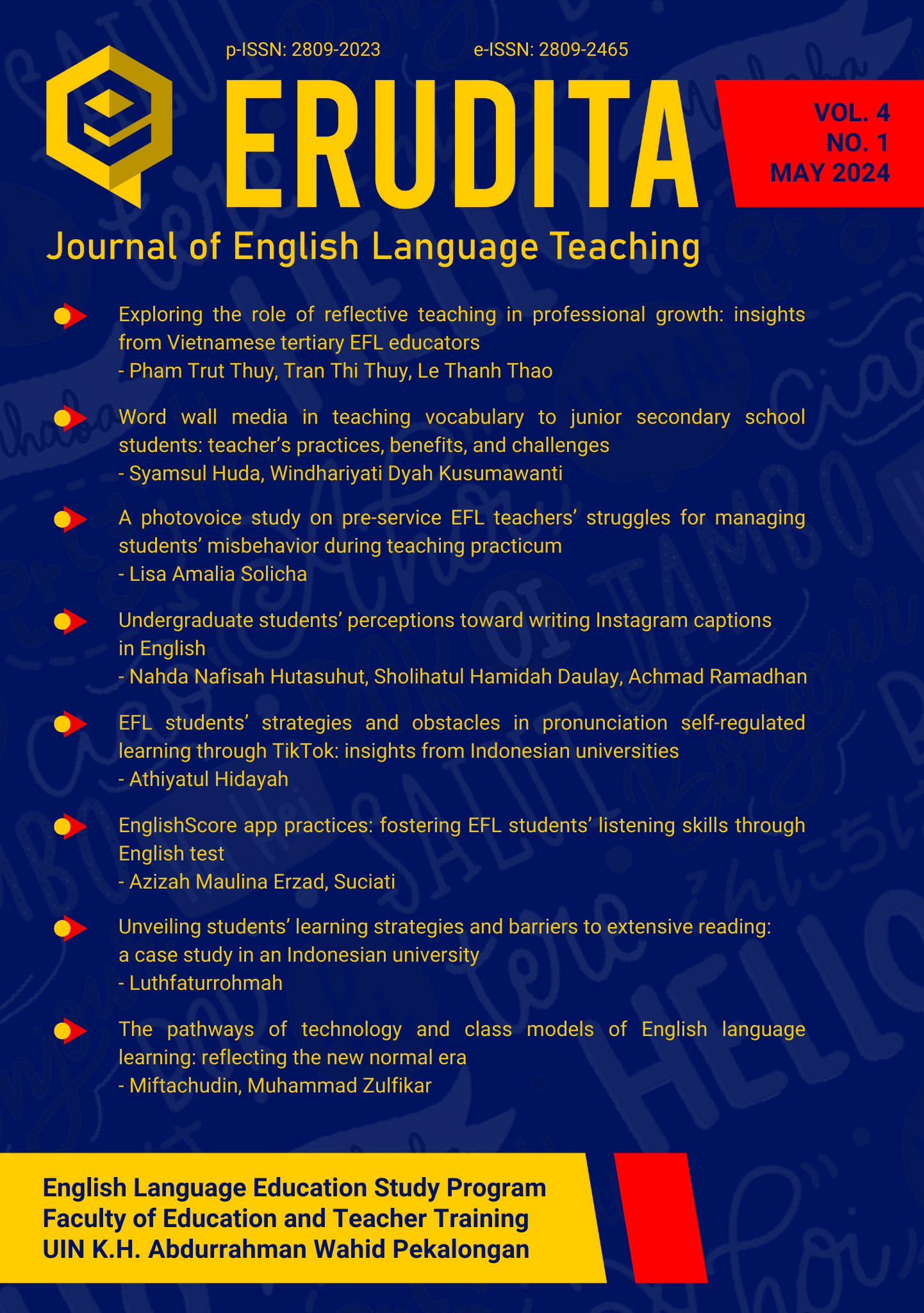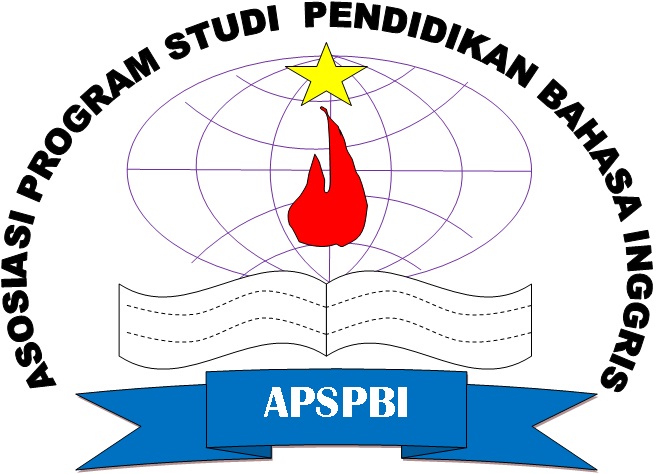EnglishScore app practices: fostering EFL students’ listening skills through English test
DOI:
https://doi.org/10.28918/erudita.v4i1.8532Keywords:
EnglishScore, EFL students, English test, Listening skillAbstract
Listening is one of the English skills that EFL students struggle with. Various English listening audio can be used as listening materials. However, doing a listening test can be an alternative to enhance listening skills. This study highlights how the EnglishScore app affects listening skills and the benefits and drawbacks of using it. A qualitative study was conducted in this research. Eighty-four EFL students who took the listening subject filled out an open-ended questionnaire using Google Forms to collect the data. Observation and documentation were also used as data collection techniques. The research findings revealed that the students practiced using the EnglishScore app at least twice to know their improvements. Most participants acknowledged that they had a good impact on their listening skills. This app provided benefits by providing various listening materials, training the students to become autonomous learners, and managing their time well. Meanwhile, the drawbacks were that there needed to be corrections or feedback, including the potential for technical problems and the need for accommodating different learning styles or the diverse proficiency levels in the classroom.
References
Afful, D., & Boateng, J. K. (2023). Electronic learning among students at public universities in Ghana. Cogent Education, 10(2), 11–6. https://doi.org/10.1080/2331186X.2023.2222695
Alsied, S. M. (2022). The role of mobile phones as effective tools for language learning by Libyan EFL learners. JEELS: Journal of English Education and Linguistics Studies, 6(2), 135–164. https://doi.org/10.30762/jeels.v6i2.1234
Anton, O. (2021). Predicting English language learners’ proficiency level using EnglishScore android application. Journal of Digital Ecosystem for Natural Sustainability (JoDENS), 1(2), 2798–6179. https://journal.uvers2.ac.id/index.php/jodens
Ameri, M. (2020). The use of mobile apps in learning English language. Budapest International Research and Critics in Linguistics and Education, 3(3), 1363–1370. https://doi.org/10.33258/birle.v3i3.3780
Arumsari & Octaviani, S. K. (2022). Duolingo mobile application for English listening skill improvement of vocational school students. Journal of English Language and Education, 7(2), 84–95. https://doi.org/10.31004/jele.v7i2.306
Booton, S. A., Hodgkiss, A., & Murphy, V. A. (2021). The impact of mobile application features on children’s language and literacy learning: a systematic review. Computer Assisted Language Learning, 36(3), 400–429. https://doi.org/10.1080/09588221.2021.1930057
Brandt, W. C. (2020). Measuring student success skills: A review of the literature on self- directed learning. Center for Assessment.
Creswell, J. W. (2014). Research design: Qualitative, quantitative, and mixed method approaches (4th ed.). SAGE Publication.
Creswell, J. W., & Creswell, J. D. (2018). Research design: Qualitative, quantitative, and mixed methods approaches (5th ed.). SAGE.
Damanik, S. F., Nasution, N. S., Hasibuan, J. R., & Gintings, I. P. (2023). Development of android-based listening practice application (funny-fun & handy) with popular culture topic as an innovative learning media. Jurnal Kependidikan: Jurnal Hasil Penelitian dan Kajian Kepustakaan di Bidang Pendidikan, Pengajaran dan Pembelajaran, 9(4), 1206. https://doi.org/10.33394/jk.v9i4.9251
Gibson, D., Ostashewski, N., & Flintoff, K. (2015). Digital badges in education. Education Information Technology, 20, 403–410. https://doi.org/10.1007/s10639-013-9291-7
Gilakjani, A. P., & Sabouri, N. B. (2016). The significance of listening comprehension in English language teaching. Theory and Practice in Language Studies, 6(8), 1670. https://doi.org/10.17507/tpls.0608.22
Guaqueta, C. A., & Castro-Garces, A. Y. (2018). The use of language learning apps as a didactic tool for EFL vocabulary building. English Language Teaching, 11(2), 61–71. http://doi.org/10.5539/elt.v11n2p61
Handayani, A. E., & Izzah, L. (2020). Improving students listening comprehension with mobile app “English listening test.” English Language in Focus (ELIF), 3(1), 69–78. https://jurnal.umj.ac.id/index.php/ELIF/article/view/6090
Jordan, K. (2023). How can messaging apps, WhatsApp and SMS be used to support learning? A scoping review. Technology, Pedagogy and Education, 32(3), 275–288. https://doi.org/10.1080/1475939X.2023.2201590
Jusmaniar, N., Indahyanti, R., & J, N. A. (2023). The use of Dictogloss technique through JOOX application to improve students’ listening skill. Journal of English Language Issues, Trends, and Studies, 1(3), 25–32. https://jurnal-fkip-uim.ac.id/index.php/verba/article/view/176
Kim, H. (2021). The effect of mobile apps on vocabulary acquisition in EFL classroom. International Journal of Advanced Culture Technology, 9(4), 118–125. https://doi.org/10.17703/IJACT.2021.9.4.118
Kostka, I., & Toncelli, R. (2023). Exploring applications of ChatGPT to English language teaching: Opportunities, challenges, and recommendations. TESL-EJ: The Electronic Journal for English as a Second Language, 27(3), 1–19. https://doi.org/10.55593/ej.27107int
Li, J. (2021). The application of artificial intelligence technology in oral English assessment. Proceedings of ICISCAE 2021: 2021 4th International Conference on Information Systems and Computer Aided Education (pp. 1186–1189). ACM Digital Library. https://doi.org/10.1145/3482632.3483111
Maulina, M., Ignacio, J. F., Bersabe, L. A. C., Serrano, A. J. D., Carpio, N. G., & Santos, E. G. D. (2022). Technology-based media used in teaching listening skills. Exposure: Jurnal Pendidikan Bahasa Inggris, 11(1), 85–99. https://doi.org/10.26618/exposure.v11i1.6564
Miles, M. B., & Huberman, A. M. (1994). Qualitative data analysis (2nd ed.). SAGE Publications.
Namaziandost, E., Neisi, L., Mahdavirad, F., Nasri, M., & Monacis, L. (2019). The relationship between listening comprehension problems and strategy usage among advance EFL learners. Cogent Psychology, 6(1), 1-22. https://doi.org/10.1080/23311908.2019.1691338
Nurussyifa, N., & Izzah, L. (2022). Application of listening English practice in understanding listening for junior high school students. Scripta: English Department Journal. 9(2), 158–171. https://doi.org/10.37729/scripta.v9i2.2221
Purwati, T. (2019). Using mobile application to promote autonomous learning for syntax subject. E-Structural, 1(02), 142–153. https://doi.org/10.33633/es.v1i2.2142
Putri, L. M., & Islamiati, A. (2018). Teaching listening using TOEIC application. PROJECT: Professional Journal of English Education, 1(4), 486–491. https://doi.org/10.22460/project.v1i4.p486-491
Qureshi, M. I., Khan, N., Raza, H., Imran, A., & Ismail, F. (2021). Digital technologies in education 4.0. Does it enhance the effectiveness of learning? International Journal of Interactive Mobile Technologies, 15(4), 31–47. https://doi.org/10.3991/IJIM.V15I04.20291
Rama, A. N., Ahmad, D. R. P., & Nurwanti, N. (2022). The effect of English listening and speaking application on students’ listening skill at Lakidende University. Jurnal Pendidikan dan Konseling, 4(3), 1166–1171. https://doi.org/10.31004/jpdk.v4i3.4740
Sari, N. P., Susilowati, S., & Fadloeli, O. (2019). Improving listening skill using learn English by listening application. PROJECT: Professional Journal of English Education, 2(4), 455–460. https://doi.org/10.22460/project.v2i4
Shirmatov, S. T., & Akhmedova, G. M. (2024). Revolutionizing language learning with smart technologies. Excellencia: International Multi-Disciplinary Journal of Education, 02(06), 1165–1179. https://multijournals.org/index.php/excellencia-imje
Suciati, S. (2020). Speaking anxiety in EFL classroom: Categories and factors. Edulingua: Jurnal Linguistiks Terapan dan Pendidikan Bahasa Inggris, 7(1), 39–45. https://doi.org/10.34001/edulingua.v7i1.1168
Syahada, T., & Sari, S. Y. (2024). The effectiveness of English score application on pre- teaching activities to improve vocabulary mastery at SMAN 8 Padang. Journal of English Language Teaching, 13(1), 63–71. https://doi.org/10.24036/jelt.v13i1.127223
Zou, C., Li, P. & Jin, L. (2022). Integrating smartphones in EFL classrooms: Students’ satisfaction and perceived learning performance. Education Information Technology, 27, 12667–12688. https://doi.org/10.1007/s10639-022-11103-7
Downloads
Published
How to Cite
Issue
Section
License
Copyright (c) 2024 Azizah Maulina Erzad, Suciati

This work is licensed under a Creative Commons Attribution-ShareAlike 4.0 International License.















